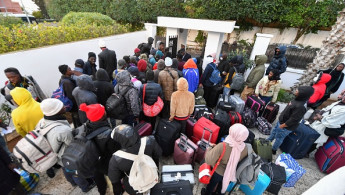'It is a prison': migrants in El-Ouardia centre say they were forced to sign repartition papers
In Tunisia, migrants trapped in a migrants centre controlled by the interior ministry said they were forced to sign repartition papers under "emotional and physical abuse," as the authorities double down on their anti-migration policy following president Saied's infamously xenophobic speech.
Liam, a Cameroonian migrant, arrived in Tunisia last April. After spending a few months in the country trying to secure refugee status, Liam was arrested and detained at Mornaguia Prison in Tunis.
Four months ago, Liam was transferred from Mornaguia Prison to El Ouardia migrants' centre where he thought he will finally gain his freedom.
Officially, El-Ouardia migrants centre in Tunis is meant to serve as a reception centre to "welcome and orient" new arrivals to Tunisia. Yet, the conditions inside the centre have long been obscured due to the prohibition of access by NGOs and lawyers.
"They call it a centre but it is a prison. We are trapped here," Liam, whose name was changed like everyone in this report, said to The New Arab.
Besides being allowed access to their phones, everything else in El-Ouardia was identical to the prison, says Liam.
Racist slurs, casual spitting and physical violence against the detainees are a daily reality in the centre, according to different sources in El-Ouardia.
There are migrant centres in each region in Tunisia, but El-Ouardia centre is the only one run by the ministry of interior.
On 27 February, the detainees in El-Ouardia held a protest which called on the UN High Commissioner to take an interest in their struggle.
Even though the centre is run by the National Guard, the border police were brought to shut down the protest.
"They handcuffed us, stripped us and beat us savagely. Some got terrible injuries," Liam said to TNA.
The situation intensified in mid-February when Tunisian President Kais Saied called for the deportation of the "hoards of clandestine migrants" in the country.
Since Saied's speech, the direction of the centre has reportedly started bringing more migrants to the centre and forcing the detainees to sign repartition papers.
"I am from Ivory. They kept pressuring me to sign repartition papers,(...) telling me things like if you stay here you will never leave this centre, you will have no life, you will never see your family," said Dembe, a migrant who signed the papers on 11 March.
Now, he regrets the choice he made "under pressure and emotional manipulation."
For Liam, the situation is more complicated. As a member of the LGBTQ community, going back to his country "is death," he says. In the last years, authorities in Cameroon have launched mass arrests against members of the community amid a new upsurge in anti-LGBT persecution in the country.
"They beat me because I refused to sign. Though, I stood my ground and I told them I am waiting for the judge's decision on my refugee status demand," Liam told TNA.
Liam says most of the people detained in the centre don't want to return to their countries of origin, yet, the daily humiliation they face in Tunisia is pushing many to give up and sign.
TNA contacted the centre for clarification, but no official was available to respond.
Since its inauguration, the operation of the El-Ouardia centre has been unclear.
Between 2011 and 2013, the centre was open to humanitarian organisations. However, since 2013, only organisations that have an agreement with the Ministry of the Interior have been able to access it.
Moreover, since 25 July 2021, the date when President Kais Saied suspended parliament, the centre has only been used for detaining migrants and operates at maximum capacity, according to the Tunisian Forum for Economic and Social Rights (FTDES). The centre reportedly hosts about sixty migrants.
Detention and liberation are administrative matters at the centre, not judicial, explains FTDES. A detainee can not appeal their case or ask for judicial support, like help from a lawyer; rather, the decision to detain the person is taken by a public servant.
"There is no guarantee that the person can contest the decision," explains Rodhan Ben Amor, member of the FTDES.
Therefore, the migrants who are detained have no information about when they might be released.
In 2020, Amnesty International called on Tunisian authorities to liberate the detained migrants because of "the inhuman situation" inside the centre.





 Follow the Middle East's top stories in English at The New Arab on Google News
Follow the Middle East's top stories in English at The New Arab on Google News
![The UAE is widely suspected of arming the RSF militia [Getty]](/sites/default/files/styles/image_330x185/public/2024-11/GettyImages-472529908.jpg?h=69f2b9d0&itok=Yauw3YTG)
![Netanyahu furiously denounced the ICC [Getty]](/sites/default/files/styles/image_330x185/public/2024-11/GettyImages-2169352575.jpg?h=199d8c1f&itok=-vRiruf5)
![Both Hamas and the Palestinian Authority welcomed the ICC arrest warrants [Getty]](/sites/default/files/styles/image_330x185/public/2024-11/GettyImages-2178351173.jpg?h=199d8c1f&itok=TV858iVg)